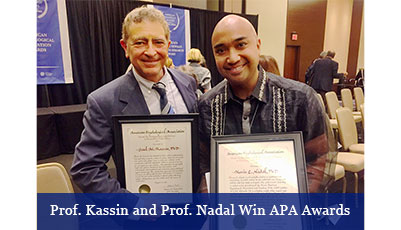
Two leading members of John Jay’s Department of Psychology have been recognized by the American Psychological Association with top honors for their contributions to the profession.
Distinguished Professor Saul Kassin, a recognized expert in the study of false confessions, was announced in mid-December as the winner of the APA’s 2017 award for Distinguished Contributions to Research in Public Policy. Associate Professor Kevin Nadal was chosen to receive the organization’s 2017 Early Career Award for Distinguished Contributions to Psychology in the Public Interest.
“How stunning,” said President Jeremy Travis upon hearing the news of the dual awards. “To have two John Jay faculty honored in the same year is beyond wonderful.”
Kassin, who is a Fellow of both the APA and the American Psychology-Law Society, has dedicated the bulk of his professional life — more than three and half decades — to studying and understanding how and why suspects confess to crimes they did not commit, and the consequences of such actions. His research has been cited by the U.S. Supreme Court, and he is a sought-after expert witness for the defense.
“I've been researching the psychology of wrongful convictions, especially those attributable to false confessions, for many years now,” said Kassin. “For the purpose of influencing matters of public policy, I've enjoyed an enormous institutional advantage teaching at John Jay — where law makers, the courts, and the news media look for ways to improve criminal justice.”
Nadal, the Executive Director of CLAGS: The Center for LGBTQ Studies at the CUNY Graduate Center, specializes in research focusing primarily on multicultural issues in psychology, particularly on understanding impacts of microaggressions on the mental health of people of color, women, and LGBTQ individuals. He is one of the leading experts on Filipino American mental health, and is President of the Asian American Psychological Association.
“I am truly humbled and honored by this,” Nadal said of the award, “and I would not be successful if my institution (and the leaders of my institution) did not support me. For that, I am truly and genuinely grateful.”



